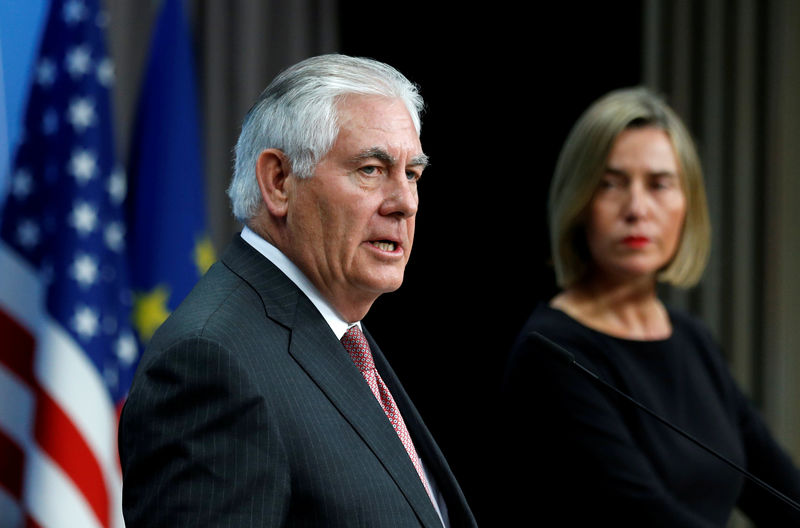By Robin Emmott
BRUSSELS (Reuters) - U.S. Secretary of State Rex Tillerson delivered a message of support to European allies in Brussels on Tuesday but their concerns about President Donald Trump's foreign policy have created a rift on a host of issues.
European allies are troubled by Trump's "America first" rhetoric, his decision not to certify Iran's compliance with a nuclear deal, his withdrawal from the Paris climate accord and now plans to move the U.S. embassy in Israel to Jerusalem.
Tillerson told Europe's foreign ministers at the European Union and NATO that the U.S. government remains committed to transatlantic ties that Trump has previously questioned.
Tillerson also sought to reassure U.S. diplomats posted abroad that his ideas to revamp the country's foreign service were bearing fruit, saying he would reveal a modernization plan for the U.S. State Department soon.
Tillerson, the former chief executive of Exxon Mobil (NYSE:XOM), said his visit showed "the strong commitment the U.S. has to the European alliance, the important role that the European alliance plays in our shared security objectives."
Before a lunch with EU foreign ministers, Tillerson stressed "shared values, shared objectives for security and prosperity on both sides of the Atlantic."
Trump visited the U.S.-led NATO alliance in May to admonish European leaders on their low defense spending. During his visit on Tuesday, Tillerson offered a more generous appraisal and gave an "unwavering" U.S. commitment to NATO's mutual defense clause, which considers an attack on one ally as an attack on all.
Tillerson ignored questions from reporters about whether he would be ousted from the White House, while his senior adviser R.C. Hammond said no EU or NATO foreign ministers raised the issue of whether Tillerson's job was secure.
In his first substantive public comments since reports last week of a White House plan for CIA Director Mike Pompeo to replace him, Tillerson said despite "a little criticism", he was on top of his job.
"While we don't have any wins on the board yet, I can tell you we're in a much better position to advance America's interests around the world than we were 10 months ago," he told senior U.S. diplomats and U.S. embassy staff at the U.S. mission to Belgium in Brussels.
Tillerson's trip will also take him to Vienna and Paris.
While Trump said last week he was not leaving and Tillerson said the reports were untrue,, Trump has also said he alone determines U.S. foreign policy, saying in a tweet on Friday: "I call the final shots."
Tillerson told U.S. diplomats gathered at the embassy in Belgium that it had been "a bit of a shock" to meet Trump for the first time when he was approached as a possible secretary of state late last year.
"CHANGE IN WORLD ORDER"
Diplomats said EU governments face a dilemma because Tillerson's views are more closely aligned with theirs but may not reflect those of Trump.
Foreign ministers had been open about sharing disagreements with the United States on various issues, Hammond said. One EU diplomat said it was "fairly predictable" given tensions on issues, including Trump's handling of the North Korea nuclear crisis and his threat to "totally destroy" the secretive country.
"Allies have been very frank today in sharing some of their views," Hammond said, although he said it was important to be honest, adding that: "dialogues only work if they go two ways."
In a speech in Berlin before flying to Brussels, German Foreign Minister Sigmar Gabriel warned that the European Union could no longer rely on the United States as its closest ally.
"The withdrawal of the United States under Donald Trump from its reliable role as a guarantor of Western-led multilateralism accelerates a change of the world order with immediate consequences for German and European interests," Gabriel said.
Standing next to Tillerson on the podium at the EU headquarters in Brussels, EU foreign policy chief Federica Mogherini also warned the Trump administration about a possible plan to the U.S. embassy in Israel to Jerusalem.
Trump is considering recognizing Jerusalem as the capital of Israel, which Gabriel also said could unleash turmoil.
"A lot of member states, including us, are concerned that the recognition of Jerusalem as the capital of Israel will not calm the conflict but rather inflame it," Gabriel said at NATO after the EU ministers' lunch with Tillerson.

The European Union, as the Palestinians' biggest aid donor and Israel's top trade partner, says it has a right to make its voice heard in any U.S. initiatives in the Middle East.